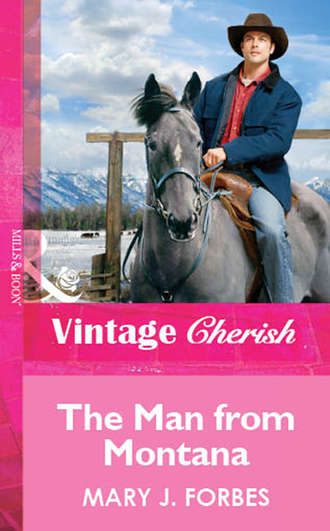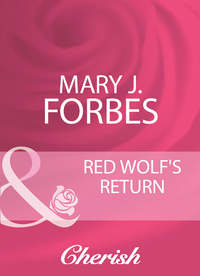
Полная версия
The Man From Montana
It was a dollhouse. Three miniature rooms with lace curtains pulled back with bows, a tiny state-of-the-art kitchen. Cozy living room with a round rug and cushiony furniture in earthy tones. Santa Fe prints on the walls. Dried hydrangeas in a tall vase on the coffee table. Above the stone fireplace hung a wooden, hand-painted sign: Welcome to Flying Bar T Ranch.
No portraits of red-haired women.
Ash wiped his boots on the welcome mat, then walked toward the kitchen situated in the far right corner. “The stove is gas.” He slanted her a look. “Ever cooked with gas?”
“Yes. The place is lovely, Ash. Thank you.” She meant it.
“Not me you should thank, it’s Tom.”
She understood. It was Tom’s ranch, after all. If Ash had his way, she wouldn’t be here. “I will. And thank you for not mentioning the series I’m writing.”
“How do you know I haven’t?”
“Because I doubt he would’ve let us in the door, and he wouldn’t have invited me to see this house.”
“You’re right. He wouldn’t.”
Ruefully, she turned away, surveyed the room again. No matter that the McKees lived solitary lives. They were good people. She did not want to hurt them, if she could help it in any way. Her father was wrong when he’d told her to “do anything to get a story.”
Ash said, “Upstairs are a couple bedrooms and the bathroom. If you want to use the fireplace I’ll haul in a few logs from the main house.”
“Thanks. This is…fine. We won’t need the fireplace.” She didn’t want him doing anything extra, not when his cold eyes and implacable jaw said he would rather she lived someplace else. Like the North Pole. Still, she couldn’t help wondering, “Do you usually rent out the guesthouse in the winter months?”
In town, she’d heard about his wife’s trail riding business—the one he’d packed away after she died.
Suddenly, his eyes changed, gentled, and she wondered how it would feel to see them soften because of her. Then the emotion retreated and the dark, icy stare settled back in place. “This is a working ranch. We don’t have time for tourists and the like during our busy months.”
And the like. City folk, out for a quick joyride on a ranch. Curiosity seekers. People of her ilk.
She tried blunt honesty. “Ash…I know you wish I hadn’t come into your life, but—”
“You know nothing of what I wish, lady.”
“Rachel,” she said quietly. “My name is Rachel. Can we call a truce? At least until I talk to Tom again about the interviews?”
“When do you plan on telling him? Or are you hoping to move in here first?”
In other words, execute a con job.
She lifted her chin. She may be a newswoman but, whether he believed it or not, she had a smidgen of propriety, of decency. She was not entirely her father’s daughter, but her mother’s child. “I’ll explain the minute we return to the main house.”
“It’s cold in here, Mom,” Charlie whispered, swinging her attention away from the man across the room. “Is it gonna be freezing when we live here?”
“No, baby.” She righted his eyewear perched at the end of his pug nose. “There’s a heating system same as in the other places we’ve lived.”
Ash strode to a gauge on the wall beside the coat closet. A flick of his finger and she heard the furnace kick in. A couple more adjustments and he’d set the daily program. Done, he walked back to where she and Charlie stood on the welcome mat.
“Trail riding,” he said, “was my wife’s business.”
In other words, apart from the ranch.
“She decorated this building, did the booking.” He looked around. “No one’s stayed here in fifty-five months.”
Since she died. Rachel would be the first. A woman he didn’t want on his ranch, a woman he certainly didn’t want sleeping in his wife’s dollhouse.
Rachel wanted to say “I’m sorry” but in light of why she was here, the words felt phony. Story be damned, this cottage was exactly what her son needed. “Charlie,” she said, “wait for me at the main house, okay?”
“Why?”
“Because I need to speak with Mr. Ash a moment.”
Her son darted a look at the man, worry in his blue eyes. “You gonna be long?”
“No.” She fiddled with his wool hat, tucked the tiny ’Vette into his pocket. “A minute. Now go on. I’ll be right behind you.”
She waited until her son slipped out the door, then turned to the man with his hands on his hips. “I don’t know what happened in the accident that took your wife’s life and I can only imagine the loss you suffered. But I assure you I won’t change or damage anything in this building or on your ranch. And I will continue looking in town for a more permanent place. As soon as I find one, we’ll be gone.”
“Don’t you mean once you’ve finished interviewing Tom?”
For a moment, silence. “Why didn’t you warn him?”
“That you’re here because of a Vietnam kick?”
“I’m here because my son needs a decent place to live.”
One brow rose slowly. “You going maternal on me, Ms. Brant?”
“It’s the truth.”
He laughed softly. “Now there’s an interesting word coming from a reporter.”
She wouldn’t back down. “You haven’t answered my question.”
“Tom handles his own battles.”
In other words, handicaps did not make a man less a man.
She sighed. “I’m unsure why you dislike me so much. Is it because I work for a newspaper, or is it me personally?”
“Who said I dislike you?”
His hot tea eyes speared her heart, ran a current down her thighs. She saw his desire, saw him fight the emotion.
Her nerves smoothed. Whether he liked it or not, his attraction to her was as true as the air they breathed.
Linear brows lowering, he moved closer. “Cat got your tongue?”
She stepped back. “I think I should go.”
Remaining alone with him hadn’t been a good idea. Rough Montana terrain, fifteen-hundred-pound horses and thousand-pound cows had crafted his body.
But she had observed his expression with his daughter, when he thought of his wife.
Something in her eyes had him suddenly turning for the door. “Inez, our housekeeper, will clean the place over the next few days. I’ll call you when it’s ready.”
“Ash…”
Head down, back to her, he waited. In that second, she wanted to touch him. Just a touch. A palm to his spine, easing the stress she sensed churning under his skin.
“You’re a kind man. I’m very—Thank you. For everything.”
His shoulders heaved a sigh. “Best get back to your boy.” Opening the door, he strode into a thick, lazy snowfall.
Tom was at the kitchen table with Daisy and Charlie, drinking hot cocoa, when Ash returned from the cottage, Rachel in tow. Seeing his stepfather in that chair, so mangled…and then for her to head back to town without a hint, without honesty…. Ash frowned. It wasn’t right.
He shot Rachel a look. Honesty is best up front.
Clever woman read his thoughts. Directly to Tom, she said, “Mr. McKee, as I mentioned on the phone the other day, renting the guesthouse isn’t the only reason I’m here.”
On her forehead sweat poked from her skin as if she’d sat for an hour in a sauna. “I’m freelancing for a magazine on the East Coast, as well as working at the town paper.”
“A magazine?”
“Yes, American Pie. It’s like The New Yorker. I’m doing a series. It’s about…”
She was nervous, Ash realized. A journalist nervous about a story. Interesting.
“It’s about survivors. From Hells Field.”
Tom scrutinized the woman for a long moment, eyes and face rigid as stone. Deep in the house, the cuckoo clock chimed the half hour. “What for?”
She leveled her shoulders. “Because it was one of the most controversial battles in that war. And you—you were the leader of a platoon of nineteen Marines of which only seven survived.”
A hush fell. Ash imagined angsty commotion in her mind as she waited: Tom would tell her to leave. He’d sic those cattle dogs on her the minute she and Charlie stepped outside. And Ash, family defender, would chase her car on his horse all the way down the road.
Tom’s lips pulled tight. “Old news. Fact is, the more years between, the more people forget. Better that way.”
She glanced at Ash, looking, he suspected, for support. For a split second his heart skipped and he almost stepped beside her. Then he saw Daisy, transfixed at the table, and he moved, instead, within reach of his daughter. Damn straight he was the defender of his family.
His positioning wasn’t lost on Rachel. Her gaze wove from one to the next, finally settling on Tom. “Wouldn’t you like something good to come out of all you’ve lost, Mr. McKee?”
The old man snorted. “You’re barking up the wrong tree, Missy. Ain’t got nothing to say about Nam.” The chair hummed backward before he spun around and headed toward the hallway that led to his private rooms.
“Grandpa, wait!” Daisy jumped up from the table. “I want to know about Hells Field.”
Ash moved around Rachel, blocking her view with his back. “Daisy, let it be.”
“No,” she cried. “God. You’d think that war was garbage we should throw out. People died, Dad. Over fifty thousand of them. Grandpa was there and he was wounded, and I don’t even know why or how. This isn’t just our country’s history, it’s our history. Mine!” Her tiny nostrils flared. “Just like Mom is.”
Tom wheeled down the hall. Conversation over.
“Argh,” Daisy muttered. “Stubborn old man.”
“Daisy.” Ash gentled his voice, touched her shoulder.
She shrugged him off. “You’re as bad as him. You don’t want to talk about Mom any more than he does about Vietnam. It’s like every time something bad happens, we put a lid on it. Like that’s gonna make it go away. It’s not. And neither is Mom’s death no matter how many pictures you hang.”
“Daisy Anne—” Dammit to hell.
“It’s the truth.” Tears shone in her eyes and his heart broke. “Thanks for trying, Ms. Brant. At least you got them to admit there was a Hells Field.”
Ash glared at Rachel. You hurt my family. For that, he could not forgive her.
But she surprised him again. “Sometimes—” she turned to his daughter “—it’s better to let history and the past fade. It softens the pain.”
Not an hour here and she was peering into places he’d nailed shut for years. He started for the door. “I think you should take your son and go.”
“Why this war?” Tom spoke from the hallway, surprising Ash. Though his stepfather had returned, severity thinned his lips. “Why Vietnam?”
“Because my dad was in it,” Rachel replied, giving the old man her full attention. Tom’s pupils pinpricked.
“My grampa calls it the black hole,” her son piped up.
“Hush, Charlie.”
Tom zeroed in on the kid. “Why’s that, boy?”
“Cuz a bunch of people went in it and never got out.”
“Charlie,” Rachel whispered. Her gaze scooted from Tom to Ash like a creature trapped by wolves. “We’ll be getting back to town. It’s been a pleasure, Tom. Daisy.” She refused to look at Ash.
Feeling’s mutual, lady. He reached for the door but his nose caught her perfume, a wisp of springtime.
Oh, yeah. He wanted her gone.
“Just a minute,” Tom said, halting them all. “I’ll make you a deal, Ms. Brant.” He looked at Daisy. Under grizzled gray brows, his eyes eased. “My granddaughter wants to know about the war for a school project. You help her write that story and I’ll do your interview.”
Ash gaped. “Pops—”
Tom held up a hand. “However, my son and I will read your work when it’s done, and you’ll fax it from this house so there’s no chance of changes.” His jaw was resolute, his eyes strict. “Ash can decide if he wants to rent the cottage.”
“Thank you.” Relief washed over her face.
Before Ash could interject, Tom spun his chair toward the kitchen, Daisy in tow.
God almighty, Ash thought. Was the old man losing it? Less than a week ago, he’d been resolute about his secrets. Now this?
Determined to dig out his father’s motives later, he waited by the door, watched Rachel help her son with his coat. The scene conjured up Susie with Daisy at seven and Daisy batting her mother’s hands, declaring, “I can put my coat on, Mom. I can do it.” Charlie held out his thin arms for his mother’s help.
At the top of the porch steps, she faced Ash. Her brows were dark and sweeping. A swallow’s wings.
He fisted his hands in the pockets of his jeans when the breeze caught a strand of her hair against that lilting mouth.
“I’m sorry,” she said, “for upsetting your family.”
If he pulled her against him, her head would rest against his collarbone. “Apology accepted.”
“Well.” She pulled on her gloves. “Goodbye, Ash.”
He could tell she didn’t expect to hear from him again.
“See ya.”
She walked through the snowfall to her car where Charlie petted Jinx and Pedro. A minute later, her Sunburst drove from the Flying Bar T and the dogs crept back under the porch.
From the office window, Tom watched Ash stride across the snowy yard. The dogs rushed from their hole to tag his heels. He was a good man, his stepson. A devoted father, a dedicated rancher. A proud man.
And upset with Tom’s decision about the interview.
Why? Ash had asked once Rachel had driven back to Sweet Creek. Why, after all these years, would Tom spill his guts to a journalist? Why not simply write it down—if he wanted Daisy to know?
What Ash didn’t understand, Tom mused, was that Rachel Brant held the key. She would unlock the past. Tom’s, Ash’s and, most of all, her own.
Tom could take it all to the grave. But she’d come, she’d come and—God help him—he could not pass up the opportunity.
Thirty-six years was long enough to live in silence. Hell, the five years following Susie was long enough.
Ash hadn’t liked Tom’s saying they needed to move on. Sure, moving on from Susie was his son’s decision to make, like moving on from Hells Field was Tom’s, but sometimes a man had to give his kid a push. Tom didn’t want Ash boarding up the pain for decades, or having it fester the way it could.
He hoped Ash rented the cottage to Rachel. For Daisy’s sake—and the boy’s—he hoped, even though Rachel’s questions would dredge up heartbreak like sludge out of a Texan oil well.
The snow fell harder. Every day Ash cleaned the walkways so Tom could wheel to the barns, see the new calves. And, dammit, that held a pain all its own.
He remembered a past he wanted to forget.
He dreamed a past he wanted to forget.
They had lived long enough in a house of mourning. Susie’s pictures everywhere collecting dust. The cottage sitting empty and cold. The summer trail riding business lying fallow.
A half decade of walking around in silence, fearing that one word, one name would break a heart again and again.
Silence couldn’t mend anguish. It couldn’t sew shattered legs and arms back onto a body. It couldn’t erase memory.
Tom knew.
Rachel Brant would change their lives and in doing so change her own. Ah, but she had her mother’s height, her eyes. And her father’s mouth and hair.
Yes, Miss Brant would discover the truth with these interviews. They’d all come to understand the truth.
Tom felt it in his gut.
Like when the VC waited in the trees above their trail.
The time had come.
Chapter Three
Oh, yeah, Ash thought. He got the old man’s meaning loud and clear. Tom’s past. Like the Flying Bar T was Tom’s ranch. And Ash, the stepson aka hired foreman. Stop being an ass. Tom was there when your mother didn’t have two nickels to her name.
Ash had been two, his sister Meggie one, when their biological dad died in a chopper crash in some Vietnam swamp toward the end of the war. Six months later, their mother became Tom’s nurse. A soft-spoken woman with a broken heart that Ash couldn’t heal, no matter how hard he tried.
Yes, Tom had given his name as well as his heart to Ash and his sister. He loved them as he’d loved their mother, God rest her soul.
But not enough.
Not enough to change the deed of the land into a partnership with Ash when he turned twenty, twenty-five, thirty. Not even on his last and thirty-seventh birthday.
And now here was Tom again, deciding to give interviews to Rachel Brant, pushing Daisy into the “moving on” mix. Daisy was Ash’s daughter, not Tom’s.
And what the hell was the old man up to prodding Ash to rent Susie’s cottage to Rachel Brant? Not that he hadn’t thought it over, but still. That guest cottage was his. His money, his time had gone into its construction.
Tom might have final say in matters of the Flying Bar T, but not on the cottage. The thought rankled. Why, Pops? Why haven’t you changed the deed? Afraid I might cause a financial disaster with my nonexistent reading skills?
In school, Ash had endured countless methods designed to interpret the printed word. A few strategies had helped somewhat, others caused more confusion, and later there had been an adult support group in Billings.
In his midtwenties, because Susie had wheedled him to take a course, he’d worked daily with a tutor specializing in reading difficulties and learned a measured technique that, at the time, allowed him to decipher enough words for comprehension. A laborious and painful process which, over ten years, Ash let slide. Too damned difficult to fumble over on his own.
“To hell with it,” he muttered.
In the barn’s office, he grabbed the ear-tagging pliers and a sack of tags, then headed for the calving barn where his cows, his cows, were sheltered from snow, cold wind and frozen nights.
Concentrate on the animals. They’re what matters.
Rolling aside the doors, he stepped into the warm cavern. At the Dutch door closing off the hallways, he ordered the dogs to stay before wandering through to the cattle.
Large box pens ran up and down the perimeters while the interior’s free space spread like a rectangular field for the animals to take shelter.
This morning, the double rear doors stood open. With the milder temperatures, most of the herd huddled outside around feed he’d forked onto the snow and into the bins.
A pair of newborn Angus calves lay on fresh straw inside the barn. Twins. The cow’s rough pink tongue cleaned their wet coats. Lifting her broad black head, she eyed Ash.
“It’s okay, mama,” he crooned softly, walking toward the pair. He clipped tags onto the calves’ left ears, number one hundred and two and three.
He read the tags five times to make sure, though, oddly, numbers had always been easier than words. He studied the twins. Of the calves born so far, these two tallied forty-eight bulls. Good odds for beef sales.
“Dad?” Dressed in high-topped work boots and her red parka, Daisy came across the barn. “You mad at Grandpa and me?”
“No, honey.” Nothing I can’t deal with.
She dogged him out of the barn, into the herd. “Then why are you hiding out here instead of eating lunch with us?”
Ever the perceptive one, his Daiz. “I’m not hiding. Just checking to see if we have more calves. The pair in the barn were born in the last hour.”
“You think Grandpa’s wrong letting Ms. Brant interview him, don’t you?”
“Not for me to say what your grandfather can or cannot do. He’s his own person.”
“Okay, then you don’t want me helping with the story. I saw it on your face.”
“We don’t know anything about this Ms. Brant. She blew into town two weeks ago. My question is why? To write an old war story? What for? More to the point, why now?”
He pushed through the hulking cattle. Snow breezed into his face along with the scent of hay and hide.
Daisy trudged after him. “You can’t judge every journalist because of Mom’s death.”
“It has nothing to do with her death.”
“Yes, it does. You even said so when I wanted to write our high school column last September. The first thing out of your mouth was, ‘You want to be like that guy who killed your mother?’ Jeez, like I’d run out, get my license and crash a car into some innocent person, all for a story.”
He swung to a stop. “Your mouth’s getting way too brazen, young lady.”
She threw up her hands. “Argh! You’re impossible! No wonder no one wants to be your friend.” Wheeling around, red hair flying, she stormed through the cattle, back into the barn.
Ash watched her go. His heart hurt. His pixie-girl was on a fast track to independence and there wasn’t a damn thing he could do. Oh, yeah, he knew she had a flare for the written word. In first grade, she was already reading the scroll line on CNN.
That same year, Susie bought their daughter the first Harry Potter novel. The book had caused a horrible argument between Ash and his wife.
Bottom line: he’d felt the content too advanced for his tiny daughter with her missing front teeth. And Susie, eyes flashing, had retorted, “How would you know? You can’t read.”
Something had died in Ash that day.
Something of Susie and of himself.
She had hoisted his dyslexia as an obstacle flag in the road of their child’s education.
He hadn’t expected to feel inadequate in his marriage. But that day he had. He’d felt unskilled as a man and inept as a father. Later, Susie had apologized, but the words remained. Dangling in his ear for all time.
He stared around at the cows. Dim-witted beasts. Like him. Daisy was right; his friends were few. Caution learned the hard way.
Rachel Brant’s soft voice whispered through his mind. “You’re a kind man.” He shook his head. Hell.
The last damn thing he needed was another woman in his life. Daisy was his life. Tom. The cows.
Damn straight.
They were his life and they were enough.
On Wednesday, Rachel tapped her fingers on her Rocky Times desk. Should she call the Flying Bar T about the guesthouse? Yesterday, the greasy-haired manager at the Dream On Motel had sputtered about a month’s commitment. The thought of Charlie in that grubby room another night sickened her.
At two-forty-five, she called the ranch.
Tom answered and gave her Ash’s cell phone number. “He’s the one you need to talk to,” the old vet told her.
Of course. It was his wife’s guesthouse, after all.
Ash picked up on the second ring.
“Hello, Ash,” she said cheerfully. As if she called him every week, as if her pulse hadn’t executed a nervous kick. “Rachel Brant here. I was wondering—”
“It’s ready.”
“Oh.” Were you planning to let me know? “We can move in, then?”
“Yeah.”
She fisted her hand in a yes-gesture. “Would this afternoon be too soon? Say right after school? I’ll rent a U-Haul right away to take our stuff to the ranch. It shouldn’t take more than a couple hours, tops.”
“What time this afternoon?”
“I work till three, then I get Charlie from Lewis-Clark Elementary.” And she needed to check out of the motel, buy some groceries for a decent supper. “Say four-thirty-ish?”
“Four-thirty it is. I’ll leave the key with Inez.”
“Inez?”
“Our housekeeper. I’ve left instructions with her, in case you have any questions.”
“So you won’t be there?”
“Probably not.” Pause. “Will someone be helping you?”
Was he concerned? “We only have a few boxes and some clothes.”
“No furniture?”
“No.” What was the point when she moved every other year to yet another town, chasing yet another part of the series?
“I see.”
Actually, he didn’t, but explaining would incite questions she had no intention of answering. “We’ll be out shortly.”
“Right.”
“Bye—”
Dial tone.
“—Ash.”
The McKees were not men of long conversations.
She dropped her camera into her briefcase—a habit she’d established years ago in case an unexpected story presented itself—and pulled her purse from under the desk. Time to get her child from school. Time to start the ball rolling on why you’re in this hole-in-the-wall.







